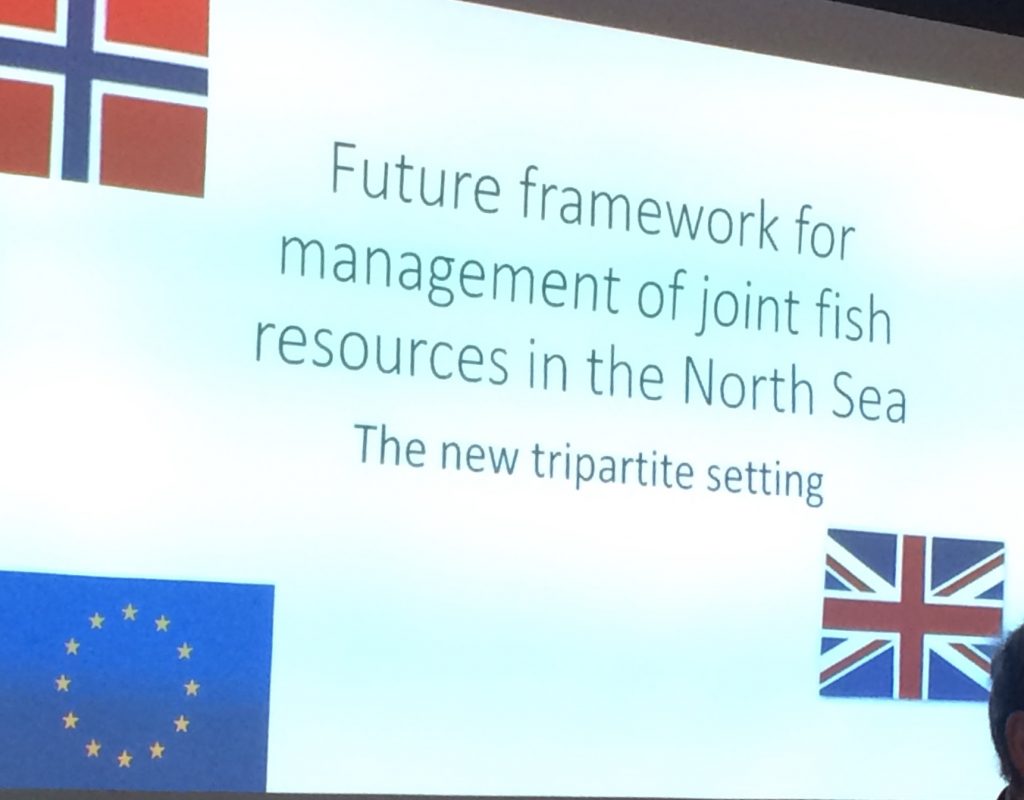30 November 2017
During the annual EU/Norway negotiations, this year in Bergen, the Norwegian delegation gave a presentation of its preliminary views on the type of joint management arrangements for the North Sea that it thinks will be necessary to accommodate the UK as an independent coastal state after March 2019.
The presentation, entitled Future Framework for management of joint fish resources in the North Sea, was not a formal agenda item but it is clear that Norway considers that it is important to begin thinking now about what format the new arrangements should take.
The essential elements in the Norwegian vision are:
Future Cooperation: Basic Principles
- Relevant modern management principles
- Goal: increasing long-term total out-take
- Goal: utilisation of all fish; and all of the fish taken out of the sea
- Respect for the different starting points for the management systems of the parties
The new tripartite setting after the UK leaves the EU, and therefore the CFP, will require the establishment of new legal and institutional structures. To this end Norway proposes a joint EU, Norway, UK Fisheries Commission, responsible for managing the joint stocks in the North Sea. The North Sea Fisheries Commission would be responsible for an annual agreed record; it would also make decisions on total allowable catches for shared stocks; and decisions on what stocks to include in the agreement.
Norway made the point that quota exchanges are the glue that holds the agreement together and these could be included as (bilateral) annexes to the annual agreement. Permanent sub-groups could work on areas such as monitoring control and enforcement, technical regulation and the development of management plans.
A new framework agreement would:
- Define the geographical scope of the Agreement
- Outline the main principles for cooperation
- Shape the institutional framework for negotiations etc
There is question mark over the appropriate legal status of the Agreement. This could take the form of a legally binding document according to the internal procedures of the parties, or a less formal type of agreement.
Sharing and Access
Crucially, the Agreement would also cover the important areas of future sharing of the stocks (which are currently not codified) and access arrangements. These could be included in the form of bilateral annexes to the framework agreement, or agreed record, or could take a trilateral form. The EU/Norway agreement in 1979, pioneered zonal attachment as the basis for establish the resources in each exclusive economic zone and therefore the basis of national quota shares.
Skagerrak
As the UK has no fishing interests in the Skagerrak, a separate agreement would be required for that sea area.
Significance
This was a brief but highly significant intervention at a crucial juncture, as the UK seeks to disentangle itself from the EU. It acknowledges, as we do, the biological, geographical and legal realities that shared stocks must be managed cooperatively and managed well, if we are to optimise the benefits.
This therefore a welcome and timely intervention which may shape the way our North Sea fisheries are managed for years to come. It will also be important to begin thinking about similar but not necessarily identical arrangements for our fisheries in Western Waters.

